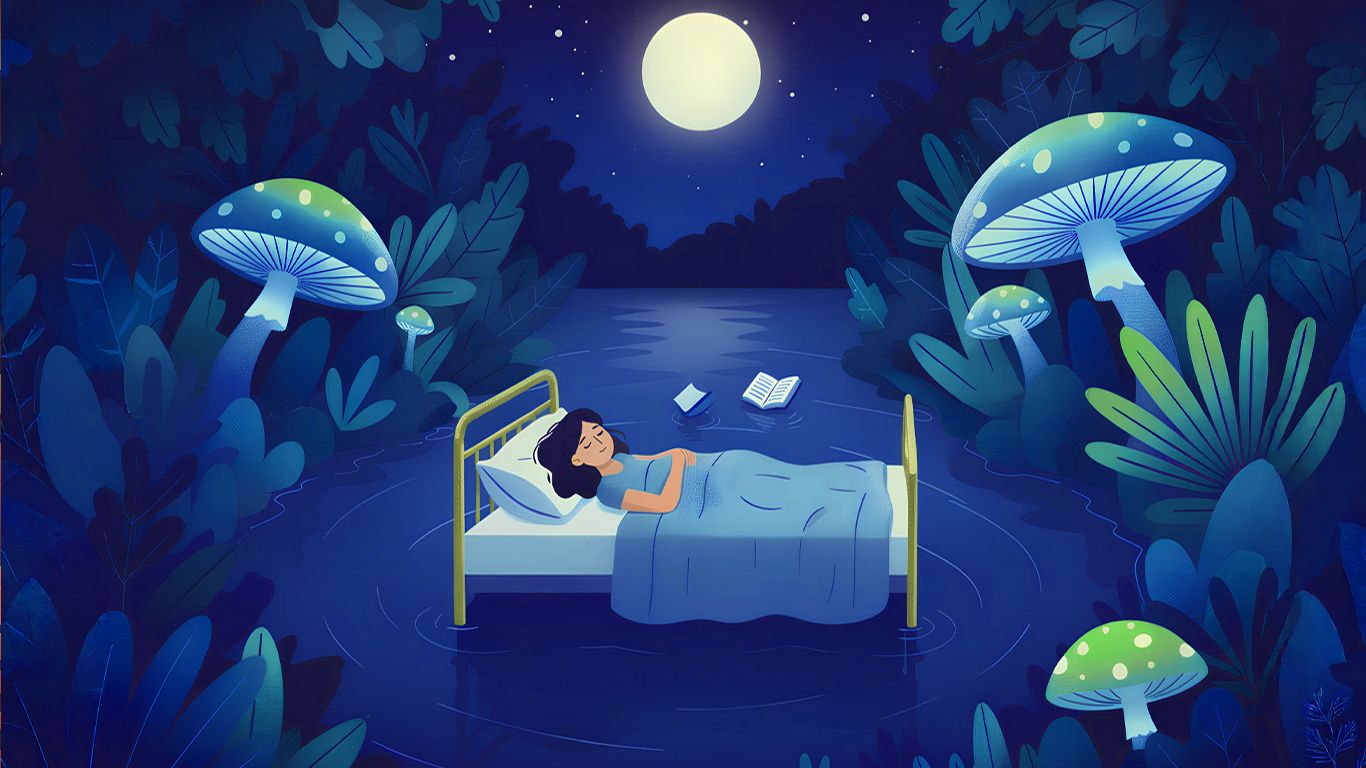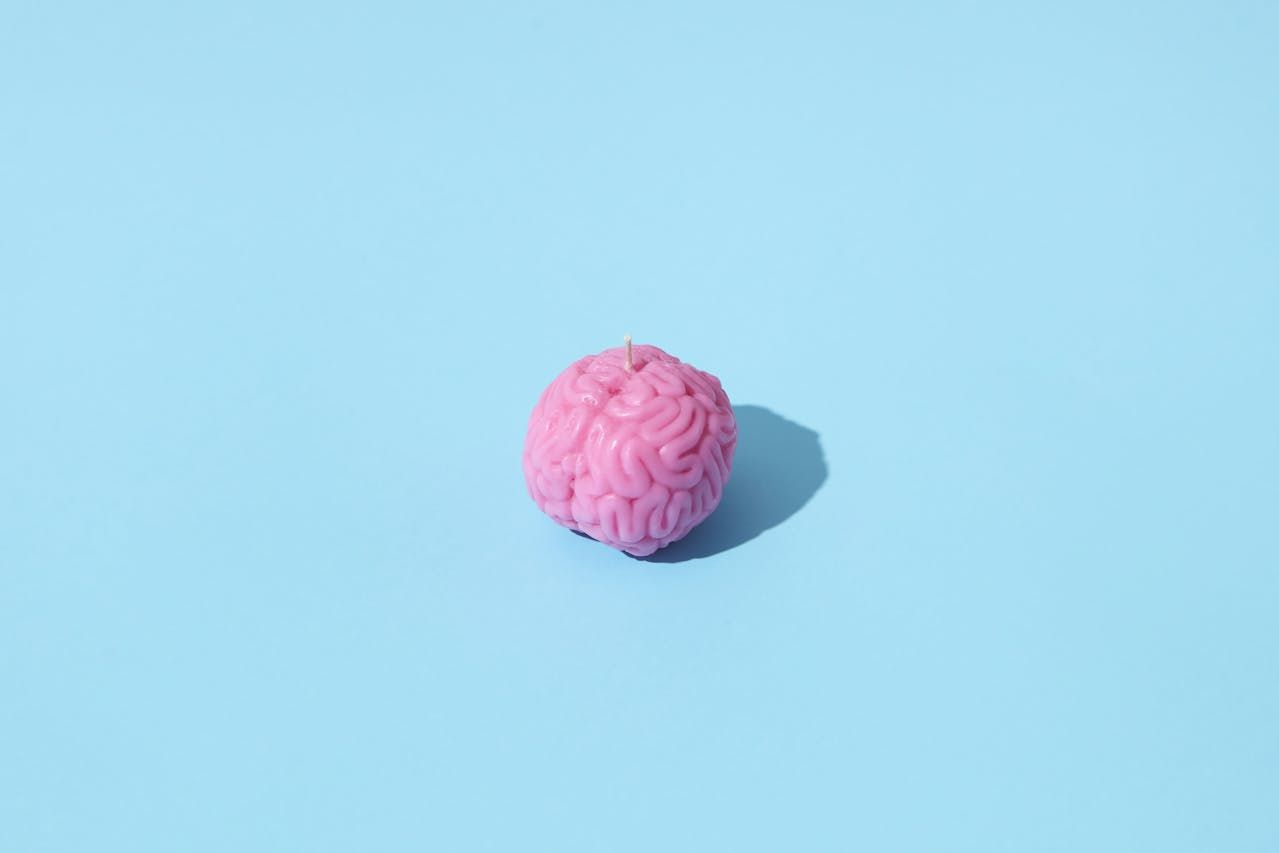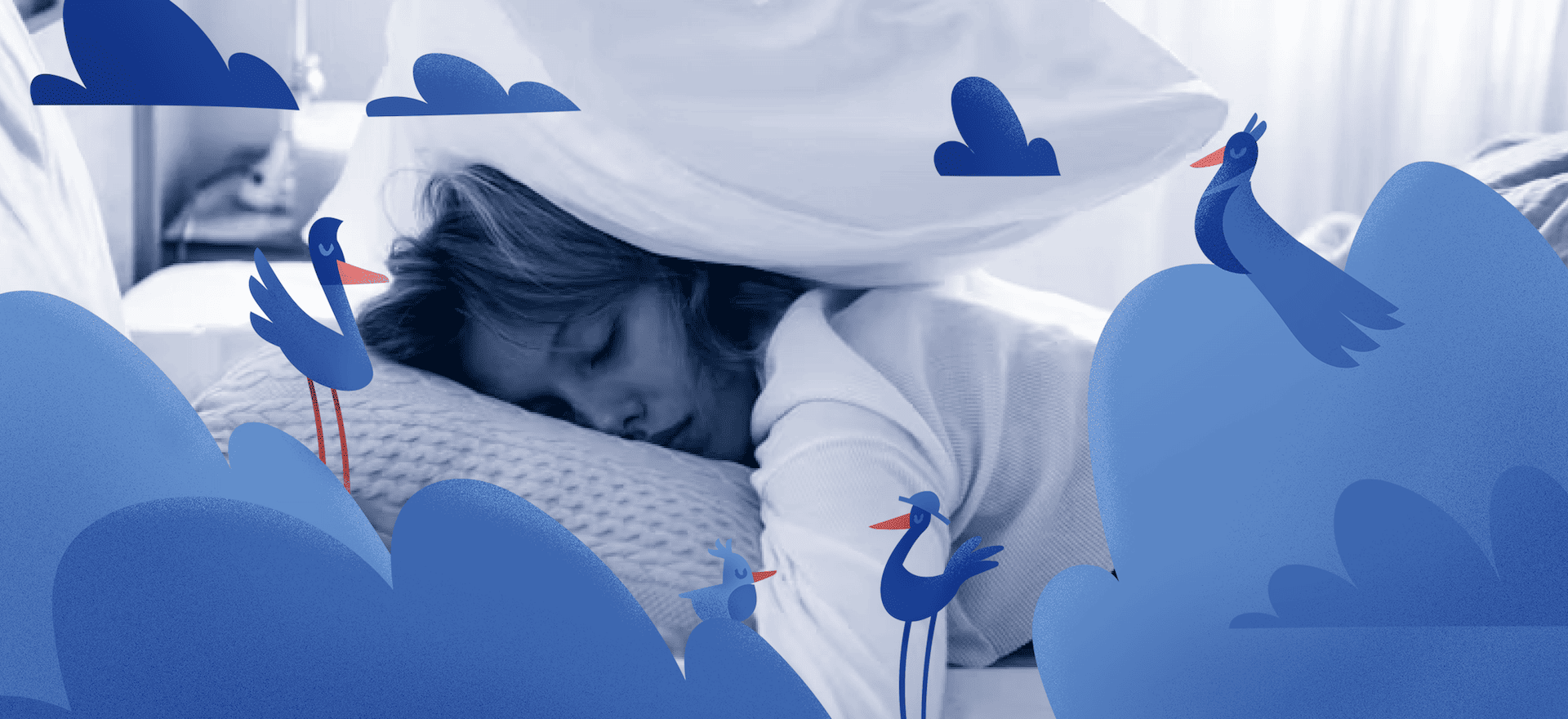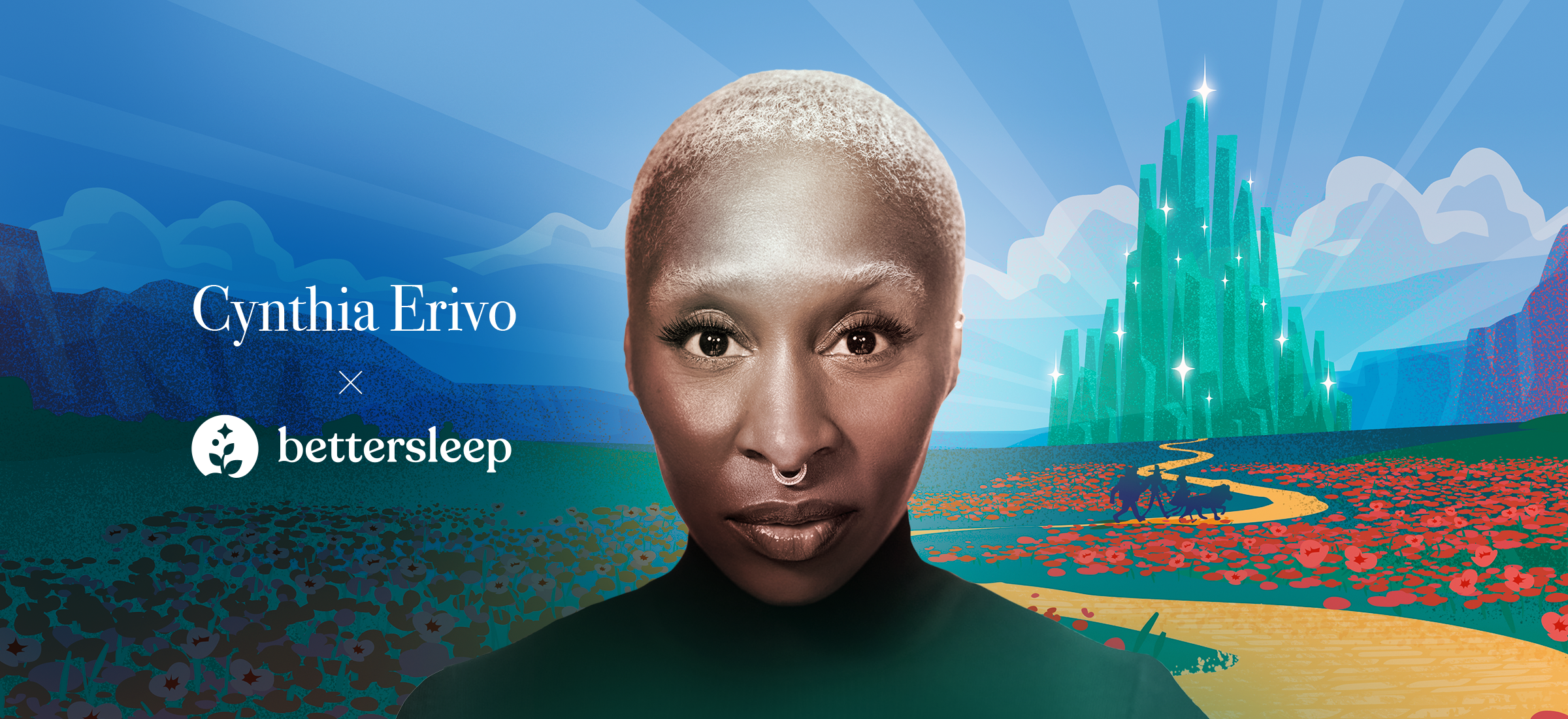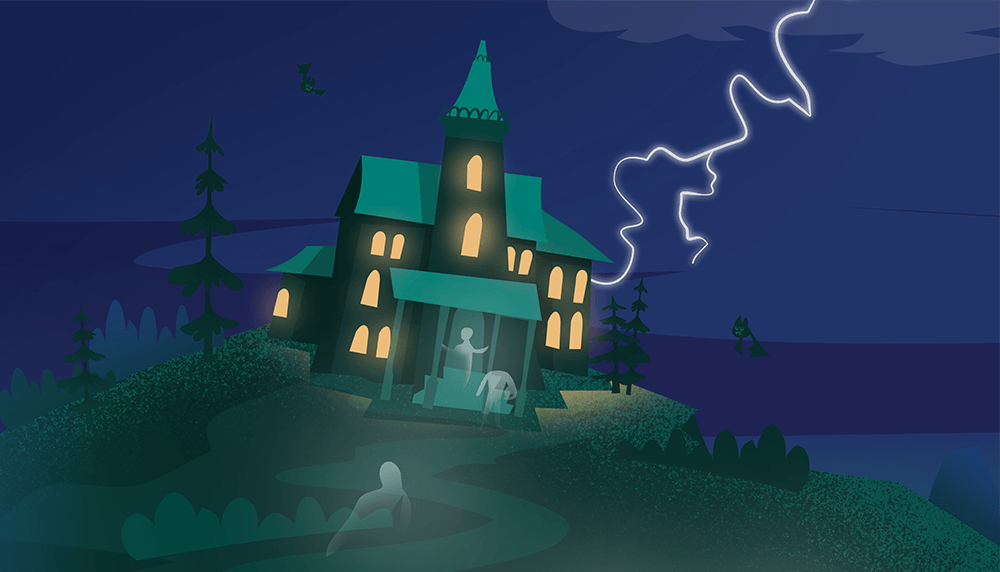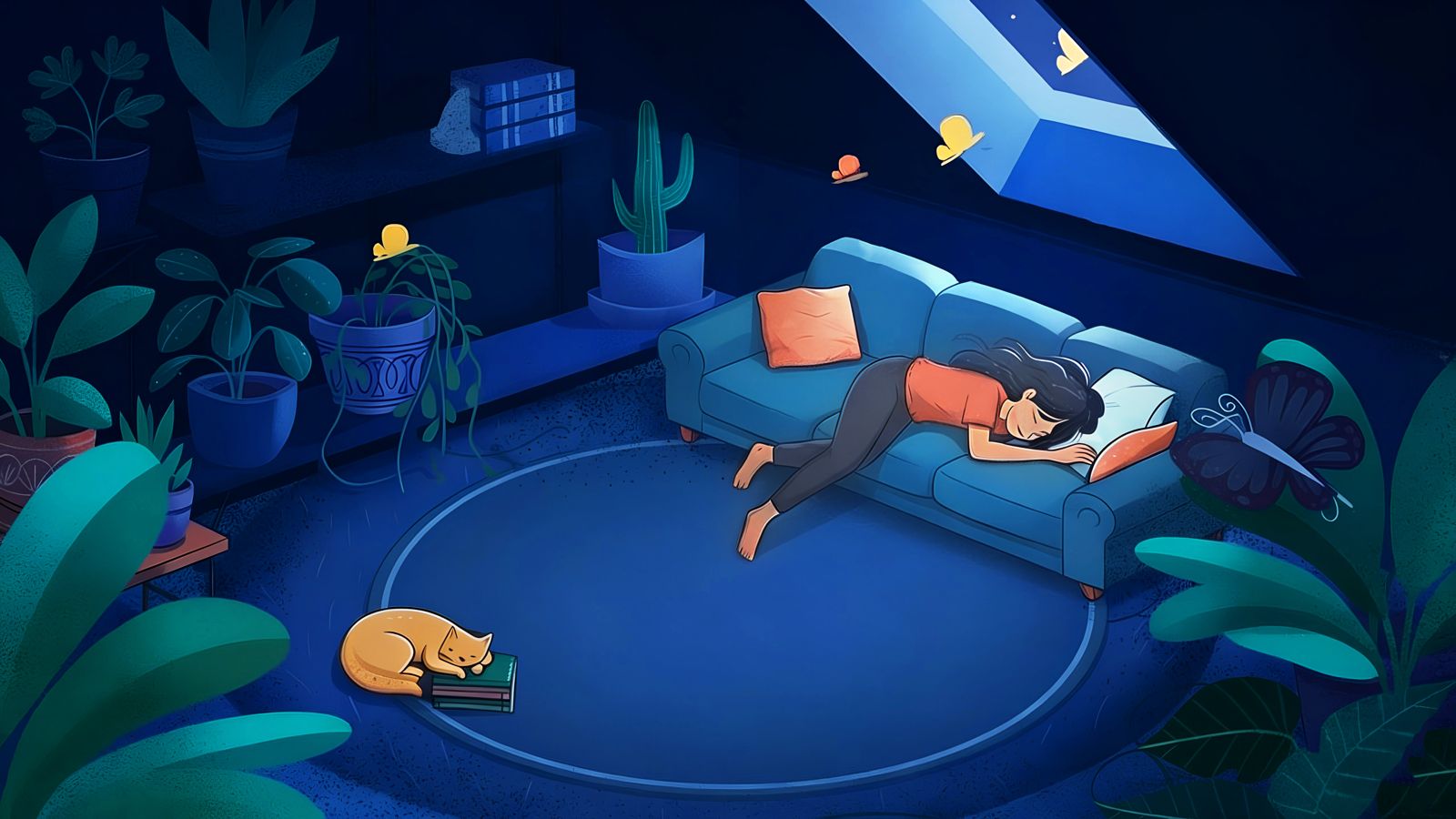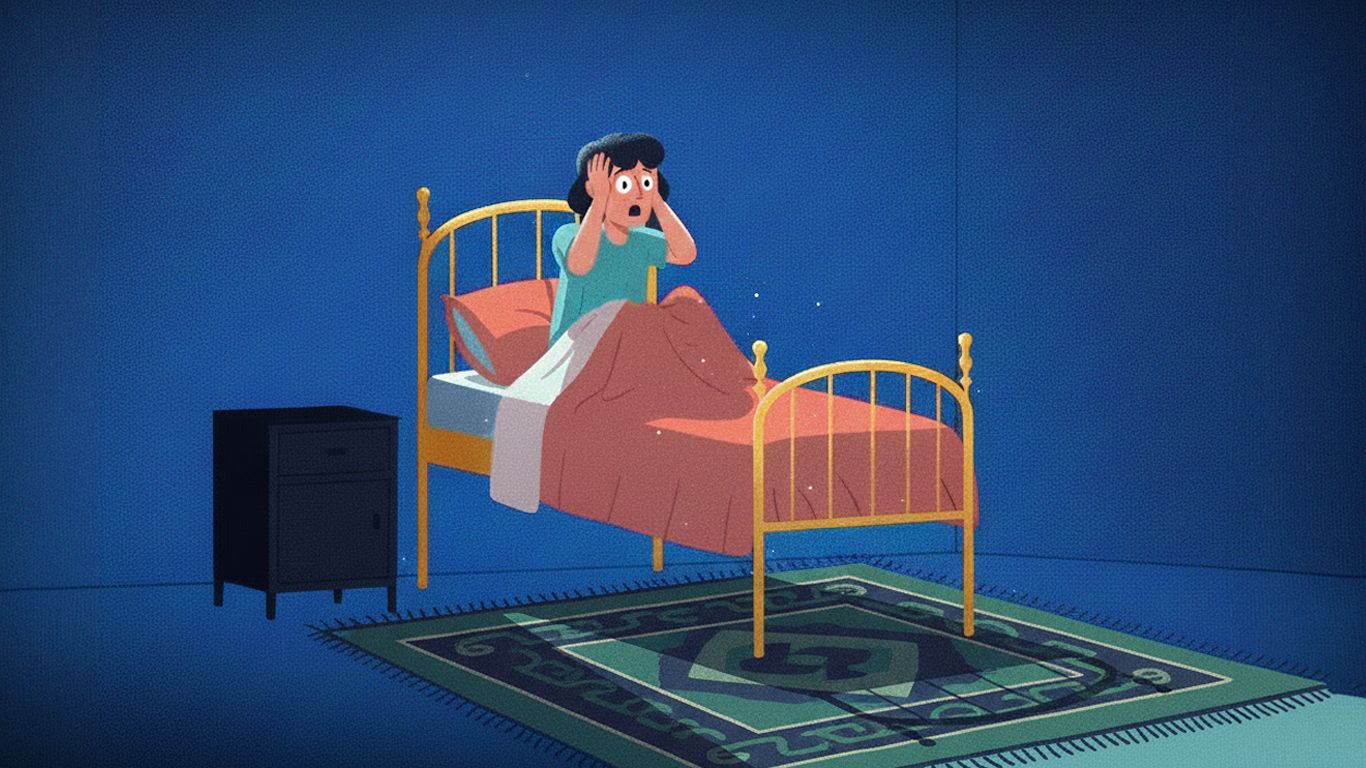
Vivid Dreams: What They Mean and How Sleep Affects Them
If you’ve woken up from a dream that felt so realistic it seemed as if you were watching a movie and not actually sleeping, you're hardly alone. These types of dreams—which, by the way, are perfectly normal—are known as vivid dreams and they come in all forms. They can be pleasant or they can be unsettling nightmares. But no matter which end of the spectrum the vivid dream falls on, you probably woke up scratching your head, wondering what triggered it, and if there was any meaning behind it.
Have you ever woken up from a dream feeling like you just had a real-life interaction with an old boyfriend or girlfriend? An experience that felt so emotional and lifelike that as you open your eyes you're not only confused about where you are, but you find it hard to believe the interaction was actually a dream and not reality? If this sounds familiar, join the club. You've probably just experienced what's known as a vivid dream.
These types of dreams—which are entirely normal by the way—typically occur during the rapid eye movement (REM) phase of sleeping and there's many reasons why you might experience them. Have you started a new medication? Did you eat a late dinner? Is your job stressing you out? These are just some of the potential causes for vivid dreams.
If you're searching for answers after waking from a vivid dream, this article will explain everything you need to know including what might cause these types of dreams and the meaning behind them. We'll also dive into some helpful calming strategies, including some go-to resources offered inside the BetterSleep app.
What Are Vivid Dreams?
Let's start with the most basic question. What exactly are vivid dreams? A 2023 study published by the Journal of Clinical Sleep Medicine explains that vivid dreams are dreams "that feel real or are associated with dream enactment behavior." In fact, a vivid dream can feel as clear and realistic as normal vision, says the study.
Christina S McCrae, PhD, DBSM, FSBSM, FAASM, a licensed psychologist and board certified behavioral sleep medicine expert who is the director of the University of South Florida Health's Sleep Research Lab, expands upon that definition, noting that vivid dreams are "intense, memorable dreams with rich sensory detail, strong emotions and high recall that occur when the brain's visual and emotional centers are highly active while logic centers are suppressed."
These types of dreams occur during REM sleep, a phrase you've likely heard before, which identifies the stage of sleeping when brain activity is most similar to when you're awake. The name REM is based on the movement of your eyes behind your eyelids, in other words, rapid eye movement.
This is in contrast to another phase of your nightly sleep known as non-REM or NREM, which is mostly made up of light sleep and slower brain waves. Though as you progress through NREM sleep, it becomes a deeper sleep with stronger brain waves.
Here's the important takeaway from all this: The different phases of sleep you experience each night come with different types of dreams. And REM dreams are typically your more vivid, bizarre and fantastical dream session. "While NREM dreams are more coherent and reality-based," says McRae.
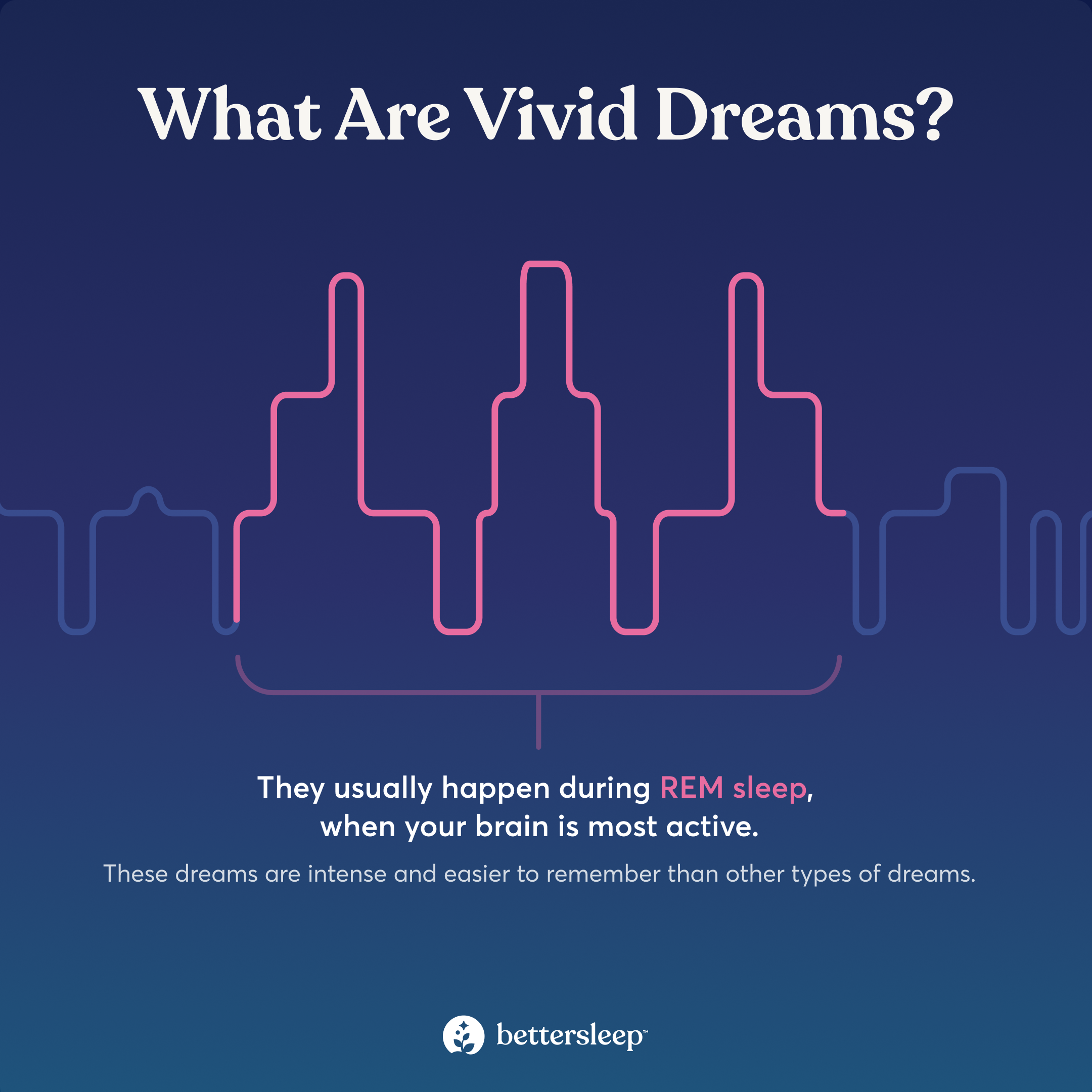

What Causes Vivid Dreams?
Waking up from a dream that felt like reality can make you wonder, why are my dreams so vivid? And what causes vivid dreams? These types of dreams can be triggered by many different things, everything from a new medication to an increased level of stress or anxiety in your life. Even making changes in your sleep schedule may trigger more vivid dreams. Let's take a closer look at some of the common factors that may impact the dreams you experience.
- *Sleep disruption: Sleep disruption can include having an irregular sleep schedule or simply not getting enough zzzz’s each night. It may seem harmless enough at the time, but when your sleep is disrupted it can put a dent in your REM sleep time and cause sleep debt. To compensate, REM rebound takes place, which means you experience longer, more intense REM sleep, causing more vivid dreams.
- *Stress, anxiety, major life changes, trauma exposure: Any one of these conditions can potentially lead to vivid dreams. Stress in particular can trigger your body's hypothalamic-pituitary-adrenal (HPA) axis, which is your body's primary way of responding to stress. This in turn increases your cortisol levels and alters sleep architecture, or the basic structural organization of your sleep cycle. And when that happens, you may have more intense dreams. BetterSleep's meditation and breathing programs can help you cope with day-to-day stress and release it, allowing you to sleep more peacefully.
- *Medications and substances: Many different substances and medications have been linked to vivid dreams and nightmares. For instance, sedatives, hypnotics and amphetamines are associated with nightmares. Alcohol use may also trigger nightmares, as can SSRIs/SNRIs, according to a report in Psychology Today. Still other drugs and supplements known to cause vivid dreams include antihistamines, beta-blocker medications and melatonin. However, individual experiences can vary, and a medication that seems to cause more abnormal dreams for one person may reduce dream recall (the ability to remember dreams) for someone else.
- *Diet and timing of meals: Surprising as it may sound, even eating a heavy meal or drinking a cup of joe late in the evening can cause vivid dreams. The same goes for consuming especially spicy food. "Late heavy meals increase metabolism and body temperature, fragmenting sleep and enhancing dream recall," says McCrae. "Spicy foods raise body temperature and cause discomfort, disrupting sleep and increasing REM awakenings." As for the caffeine we all love, its half-life can impact your sleep, causing sleep disruption and concentrating and intensifying REM periods.
- *Illness or fever: Have you been sick lately? Had a fever? Or experienced a hormonal shift? These are all additional, potential triggers for vivid dreams. "Elevated body temperature affects neurotransmitter balance, which regulates REM sleep and dreaming," says Dr. Chelsie Rohrscheib, PhD, head sleep expert and neuroscientist for Wesper. "Fever also causes sleep fragmentation, which can affect the way the brain transitions in and out of REM sleep."
- *Hormonal shifts like pregnancy and perimenopause: Certain hormones also affect sleep. In particular, progesterone and estrogen impact your sleep cycle, so hormonal fluctuations, such as the normal changes during a woman's menstrual cycle, menopause, and pregnancy, can affect REM sleep.
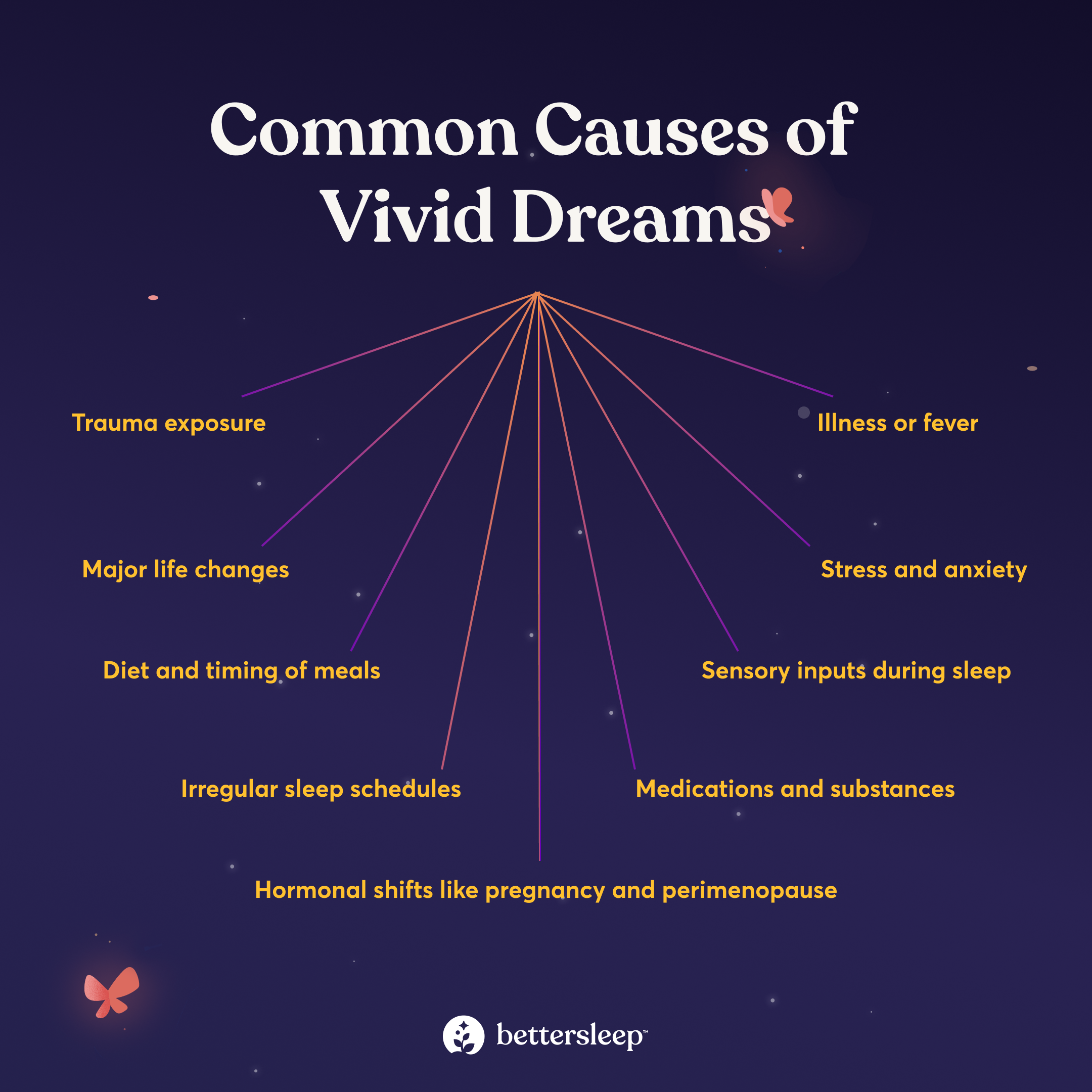

Vivid Dreams Meaning: Should You Read Into Them?
Vivid dreams can sometimes be shocking or perhaps disturbing, but what should you read into these types of dreams, if anything? And do these dreams serve a purpose? The answers to those questions are not fully known, but there are some general explanations on this front with regard to dreams.
"REM sleep and dreaming are not fully understood but we know that they play a major role in memory consolidation — turning short term memories into long term memories — emotional processing, and problem solving," explains Rohrscheib.
Typically, the exact content of the dream isn't very meaningful, however the emotions and themes of the dream are usually related to our waking life. "For instance, a dream about being back in high school and having to take a test doesn't mean much for a grown adult, however it may mean you're stressed out about something that needs your attention and completion," she adds.
When Vivid Dreams Signal a Sleep or Health Issue
For the most part, vivid dreams are harmless, experts say. But there are cases when these dreams are part of a broader health issue or may be a sign of an underlying condition.
For example, nightmare disorder is a rare condition involving recurrent, disturbing nightmares. This condition can cause fear of sleep and daytime impairment, which can impact your quality of life. The good news is that it can be treated with psychotherapies and medications.
Individuals impacted by post-traumatic stress disorder (PTSD) may experience chronic nightmares as their minds often replay aspects of trauma. In PTSD cases, the nightmares can lead to psychological impacts and impair physiological function, along with simply disturbing sleep.
Another condition, REM behavior disorder (RBD), involves physically acting out your dreams, albeit unknowingly while asleep. The movements that may be involved in such acting out have the potential to cause injury to either the dreaming individual or to their bed partner. This is especially the case when acting out a violent nightmare. If you're impacted by RBD, it's important to seek treatment.
"Red flags [for RBD] include injuries, bed partner reports of dream enactment, or sudden changes in dream frequency or intensity," says Rohrscheib, who notes that this condition is more common for mid-life individuals.
Some studies also indicate that you may be more prone to emotional dreams or nightmares if you are impacted by sleep apnea. Though it may be possible to improve this condition with continuous positive airway pressure (CPAP) treatment.
How Sleep Quality Shapes Dream Intensity
Terms like sleep structure or sleep architecture may be new to you or seem like medical industry jargon, but these are also important factors when it comes to the dreams you experience each night.
For example, sleep occurs in four stages, which are: N1, N2, N3, and REM. Together, these stages complete one sleep cycle. The sleep you experience during stages N1 to N3 are non-rapid eye movement (NREM) sleep, and each of these stages should transition you to progressively deeper sleep.
A so-called typical night's sleep will include four to five sleep cycles. As you go through these cycles, the first REM experience is short, but as the night goes on, the REM periods that are part of each cycle get longer. This changing architecture directly influences dream occurrence and intensity.
"The structure of your sleep matters. More consolidated REM sleep later in the night usually produces more memorable dreams, especially close to waking," says Riley Otis, a certified sleep science coach with Sleepopolis. "Fragmented sleep, with lots of interruptions, can also make dreams feel more intense.Your natural sleep pattern, or chronotype, and the timing of naps can influence how vivid dreams feel and how well you remember them."
Preventing Vivid Dreams: What Actually Helps
If you're looking for ways to prevent vivid dreams, the good news is there are various options and many can be easy to implement.
- *Sleep schedule: The first step is to maintain a consistent sleep schedule. This is fundamental to reducing vivid dreams, says McCrae. "Going to bed and getting up at the same time every day helps prevent sleep deprivation and may discourage vivid dreams caused by REM rebound," she explains. "A consistent wind-down routine signals to the body that sleep is approaching, helping to regulate circadian rhythms and stabilize sleep architecture. This regularity prevents the REM rebound phenomenon that occurs after irregular sleep patterns, which can intensify dream vividness."
- *Light and temperature: Light and temperature can also play a role in preparing your body for sleep and ensuring optimal sleep. For instance, McCrae suggests dimming lights in your home in the evening to support natural melatonin production by signaling the body to prepare for sleep. In addition, maintaining a cool room temperature promotes better sleep quality and reduces sleep fragmentation that can lead to increased dream recall, she says. Morning light exposure is equally important because it helps reset the circadian clock, strengthening the sleep-wake cycle and promoting more consolidated, less disrupted sleep at night, which reduces the likelihood of frequent REM awakenings that enhance dream recall.
- *Eliminate dream-intensifiers: Consider limiting late consumption of caffeine or alcohol, which, as touched upon earlier, can lead to vivid dreams. Similarly, avoid eating late at night and instead have an earlier dinner. "Limiting substances that affect sleep architecture is crucial for managing vivid dreams," says McCrae.
- *Stress downshifting: If you experience a great deal of stress, (which can also lead to vivid dreams) try implementing various techniques to address this condition in your daily life. Some of the options (which can also improve your sleep, as it turns out) include exercise, breathing exercises, meditation, and yoga.
- *Media hygiene: Avoiding intense media content on your iPad, iPhone or other digital device close to bedtime is important for reducing vivid dream content. Watching violent, frightening or emotionally intense media before sleep can directly influence dream themes and increase nightmare frequency, says McCrae. Moreover, the blue light emitted by screens suppresses melatonin production, delaying sleep onset and potentially affecting sleep quality. Try establishing a media curfew, (typically 30-to-60 minutes before bedtime).
Targeted Techniques (If Dreams Are Distressing)
If you're experiencing distressing dreams, it may require adopting even more targeted techniques. This could include dream journaling, which involves recording dreams immediately upon waking if you remember them and tracking patterns, triggers, and themes.
"This practice helps externalize disturbing content and creates distance from the emotional impact," explains McCrae.
Experiencing recurrent nightmares? This type of dream is often associated with PTSD and you may want to explore imagery rehearsal therapy (IRT). IRT involves selecting a particular, repetitive nightmare and writing out the dream. As part of this process, the individual changes the script of the dream or the imagery it includes. This technique can reduce how often nightmares occur and reduce the distress experienced.
One more option to consider is an approach known as grounding on awakening. "When awakening from a distressing dream, grounding techniques help reorient to reality and reduce physiological arousal," notes McCrae. As an example you could use the 5-4-3-2-1 coping technique to calm anxiety, which involves identifying 5 things you can see, 4 things you can touch, 3 things you can hear, 2 things you can smell and 1 thing you can taste. This process anchors your consciousness in the present moment.
Medication & Supplement Considerations
Another important factor to consider when you're pondering the potential causes of your vivid dreams is medications and supplements.
Both medications and supplements can affect dream intensity, says Otis. "High doses of melatonin can also increase dream intensity, so taking the lowest effective dose earlier in the evening can help."
"If a new or adjusted medication makes dreams disruptive, it’s worth discussing with a `healthcare professional," continued Otis. "For PTSD or frequent nightmares, certain medications like prazosin may be considered."
In addition, when you're starting a new medication or changing the dosage, particularly with psychiatric medications, be sure to discuss potential effects related to dreaming with your physician.
Special Life Stages & Groups
When you're pregnant or going through menopause or perimenopause, your body experiences all sorts of hormone changes, and guess what? This too can trigger vivid dreams. But that's not the only life phase during which vivid dreams may become a more noticeable occurrence.
For some children and teens, developmental phases may also lead to an uptick in vivid dreams.
"Kids tend to have more vivid dreams and nightmares because their brain is undergoing massive neurodevelopment, which means the areas of the brain that control sleep are not fully matured," says Rohrscheib.
Children experience developmental spikes in nightmare frequency, particularly during periods of rapid cognitive and emotional development. Because a child's ability to distinguish fantasy from reality develops gradually, dreams feel more real and frightening to them, says McCrae.
"Adolescence brings additional factors including later sleep-wake preferences (delayed circadian phase), chronic sleep deprivation due to early school start times and hormonal changes that affect sleep architecture," explains McCrae. "These factors combine to increase both dream vividness and recall during teenage years."
Older adults may also be more prone to vivid dreams. This can be the result of several factors, including sleep architecture changing with age. Older adults tend to sleep less and experience reduced deep sleep or increased sleep fragmentation, which can alter REM distribution. Additionally, older adults generally take more medications, some of which can impact REM sleep and dream patterns. Some examples include antidepressants and beta-blockers, among others.
When to See a Clinician
While vivid dreams are indeed mostly normal, like we've said, in some cases, it may be necessary to seek professional help. Rayni Collins, BC-DMT, LPCS, LCMHCS, a behavioral sleep specialist and founder of E-Motive Counseling, suggests considering professional help if you've been struggling with sleep for more than a week or two—especially if you’re afraid to fall asleep, waking up exhausted, or dealing with dreams that leave you shaken.
"You don’t have to wait until you’re completely burnt out, or your sleep feels unfixable," continues Collins. "I say this all the time: sleep is one of the first things your body uses to restore itself. When it’s off, everything else—mood, focus, energy, even pain levels—can start to slide. And the longer you wait, the more tangled the patterns can become. Early support can save you months or even years of struggle."
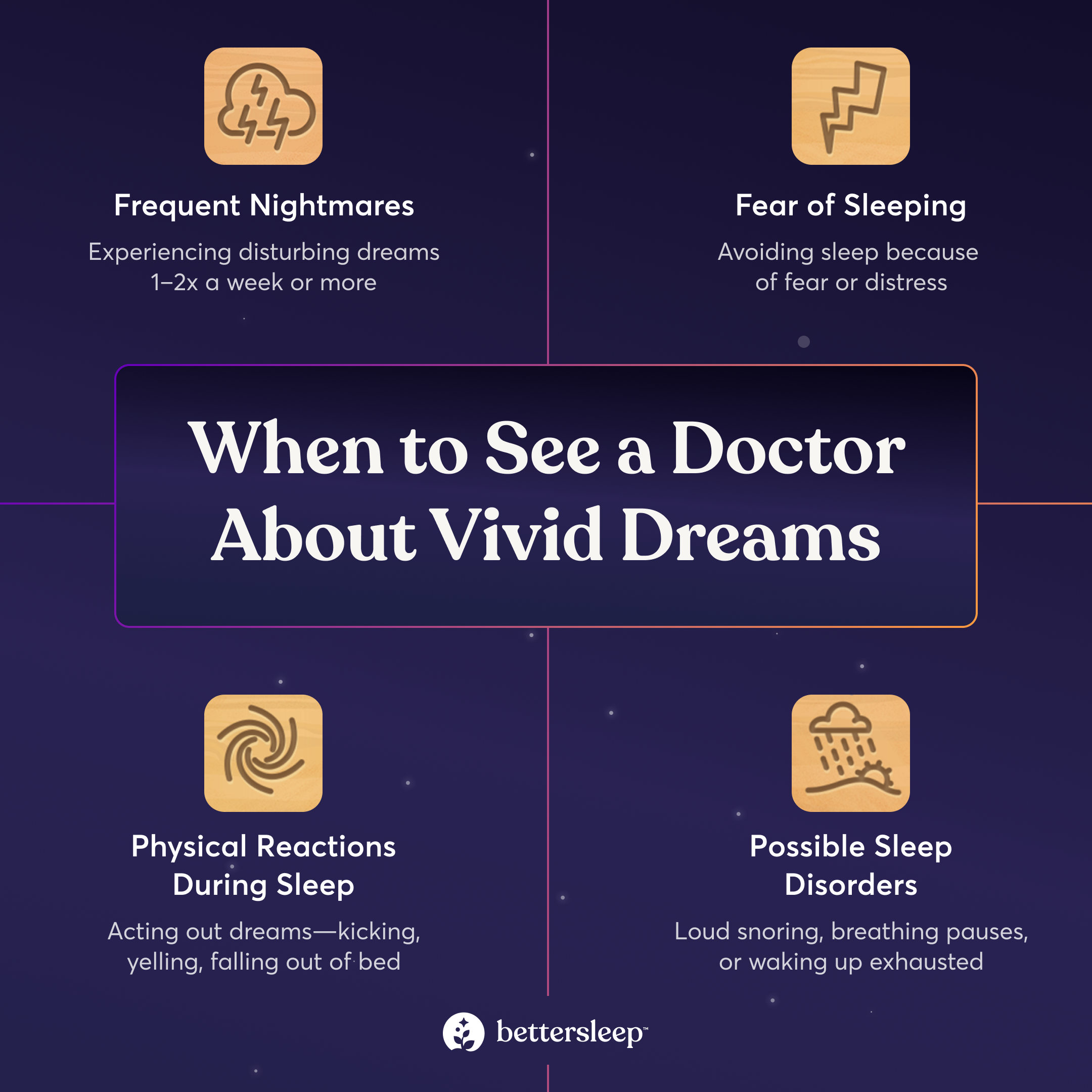

Here are some of the red flags or cases in which Collins suggests getting help may be a good idea:
- *You’re experiencing disturbing dreams 1–2 times a week or more
- *You’re avoiding sleep because of fear or distress
- *You’re acting out dreams—kicking, yelling, falling out of bed
- *You snore loudly, stop breathing in your sleep, or feel exhausted even after what should be a full night of sleep
"These could be signs of things like REM Behavior Disorder or Obstructive Sleep Apnea—both of which are real, diagnosable conditions that are treatable with the right support," says Collins. "And if you’re not sure what’s going on, that’s okay too. You don’t have to have it all figured out before asking for help."
The Bottom Line
Vivid dreams can leave you feeling surprised (and sometimes even a little unsettled) by their content. You may be wondering what your subconscious is trying to tell you and why you experienced the dream.
The important point to remember is that vivid dreams are a very normal part of active REM sleep. They can be triggered by something as simple as a late night cup of coffee. If you're suddenly experiencing one too many vivid dreams, however, and it disrupts your sleep, or your vivid dreams are simply too disturbing and you'd like to have good dreams instead, try working on improving your sleep routine. If that doesn't help, or the dreams are distressing, know that there are effective treatments and it may be time to reach out to a professional for help.
Frequently Asked Questions (FAQs)
What does it mean if you have vivid dreams?
You may have vivid dreams for a variety of reasons including experiencing stress or anxiety in your life, or starting a new medication. The occurrence of vivid dreams can also be linked to a new medication or supplement and may even be triggered by eating late at night or consuming especially spicy food.
What are vivid dreams in pregnancy?
Pregnancy involves dramatic hormonal changes (progesterone, estrogen, prolactin). Being pregnant can also cause physical discomfort and frequent awakenings. These sorts of changes during pregnancy enhance dream vividness throughout all trimesters of a pregnancy.
Do vivid dreams mean poor sleep quality?
Vivid dreams do not necessarily impact your sleep quality. In some cases, a vivid dream can actually make you feel like you've experienced deeper sleep. However, if the vivid dream is a nightmare, it may give you the feeling you've not slept well. Additionally, for some people, vivid dreams may not allow you to get the rest you need.
What's the difference between vivid dreams and normal dreams?
Vivid dreams are more intense, detailed and realistic than normal dreams. These dreams, sometimes referred to as false awakening dreams, feel so real it may even seem like you are awake.
When should I worry about vivid dreams?
Experts say that if you’ve been struggling with sleep for more than a week or two—especially if you’re afraid to fall asleep, or are waking up exhausted, or dealing with dreams that leave you shaken—it may be time to seek professional help.
Why am I suddenly having vivid dreams?
There can be any number of causes for vivid dreams including stress and anxiety or a change in your sleep schedule. Medications or supplements can also be linked to vivid dreams, as can eating too late in the evening or consuming spicy food.


